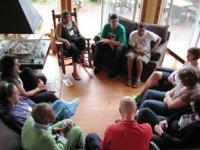Difference between revisions of "Support group"
(Created page with 'File:lighterstill.jpgright|frame *[http://en.wikipedia.org/wiki/1969 1969] ==Definition== *1: a group of people with common experiences a...') |
m (Text replacement - "http://" to "https://") |
||
| Line 1: | Line 1: | ||
[[File:lighterstill.jpg]][[File:Support_Groups.jpg|right|frame]] | [[File:lighterstill.jpg]][[File:Support_Groups.jpg|right|frame]] | ||
| − | *[ | + | *[https://en.wikipedia.org/wiki/1969 1969] |
==Definition== | ==Definition== | ||
*1: a [[group]] of people with common [[experiences]] and concerns who provide [[emotional]] and [[moral]] [[support]] for one another | *1: a [[group]] of people with common [[experiences]] and concerns who provide [[emotional]] and [[moral]] [[support]] for one another | ||
| Line 9: | Line 9: | ||
Formal support groups may appear to be a [[modern]] [[phenomenon]], but they supplement [[traditional]] fraternal organizations in some respects, and may build on certain supportive [[functions]] (formerly) carried out in (extended) [[families]]. | Formal support groups may appear to be a [[modern]] [[phenomenon]], but they supplement [[traditional]] fraternal organizations in some respects, and may build on certain supportive [[functions]] (formerly) carried out in (extended) [[families]]. | ||
| − | Other types of [[groups]] formed to support causes, including causes outside of themselves, are more often called [[advocacy]] groups, interest groups, lobby groups, pressure groups or promotional groups. [ | + | Other types of [[groups]] formed to support causes, including causes outside of themselves, are more often called [[advocacy]] groups, interest groups, lobby groups, pressure groups or promotional groups. [https://en.wikipedia.org/wiki/Trade_union Trade unions] and many environmental groups, for example, are interest groups. |
Support groups maintain interpersonal [[contact]] among their members in a variety of ways. Traditionally, groups have met in person in sizes that allowed [[conversational]] [[interaction]]. Support groups also maintain contact through printed newsletters, telephone chains, [[internet]] [[forums]], and mailing lists. Some support groups are exclusively online (see below). | Support groups maintain interpersonal [[contact]] among their members in a variety of ways. Traditionally, groups have met in person in sizes that allowed [[conversational]] [[interaction]]. Support groups also maintain contact through printed newsletters, telephone chains, [[internet]] [[forums]], and mailing lists. Some support groups are exclusively online (see below). | ||
| − | Membership in some support groups is formally [[controlled]], with admission requirements and membership fees. Other groups are "open" and allow anyone to attend an advertised meeting, for example, or to [[participate]] in an online forum.[ | + | Membership in some support groups is formally [[controlled]], with admission requirements and membership fees. Other groups are "open" and allow anyone to attend an advertised meeting, for example, or to [[participate]] in an online forum.[https://en.wikipedia.org/wiki/Support_group] |
[[Category: Sociology]] | [[Category: Sociology]] | ||
Latest revision as of 02:28, 13 December 2020
Definition
- 1: a group of people with common experiences and concerns who provide emotional and moral support for one another
Description
In a support group, members provide each other with various types of help, usually nonprofessional and nonmaterial, for a particular shared, usually burdensome, characteristic. The help may take the form of providing and evaluating relevant information, relating personal experiences, listening to and accepting others' experiences, providing sympathetic understanding and establishing social networks. A support group may also work to inform the public or engage in advocacy.
Formal support groups may appear to be a modern phenomenon, but they supplement traditional fraternal organizations in some respects, and may build on certain supportive functions (formerly) carried out in (extended) families.
Other types of groups formed to support causes, including causes outside of themselves, are more often called advocacy groups, interest groups, lobby groups, pressure groups or promotional groups. Trade unions and many environmental groups, for example, are interest groups.
Support groups maintain interpersonal contact among their members in a variety of ways. Traditionally, groups have met in person in sizes that allowed conversational interaction. Support groups also maintain contact through printed newsletters, telephone chains, internet forums, and mailing lists. Some support groups are exclusively online (see below).
Membership in some support groups is formally controlled, with admission requirements and membership fees. Other groups are "open" and allow anyone to attend an advertised meeting, for example, or to participate in an online forum.[1]
